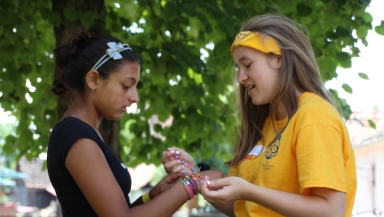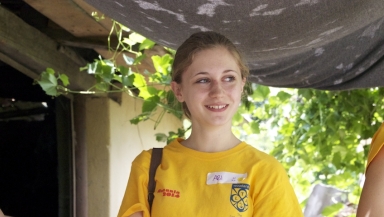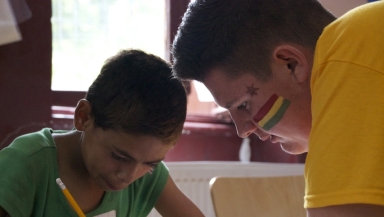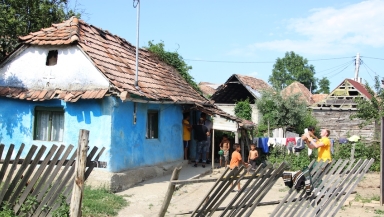
"This week has given me a reality check."
"Being here has made me really think about my life and reflect on how grateful I should be for what I have."
"I never knew they were people in Europe living in such poverty and discriminated against simply because of their race."
"I've had the opportunity to come on this trip and try to change my attitude towards the simple things of life and make a difference to people who now mean so much to me."
Those are just a few reflections from a group of 21 young people aged 13-18 who travelled to Soard, a remote Roma gypsy village in Romania.
Paul Sanderson, school chaplain and one of the adults on the trip, made a connection with Romania decades ago, first travelling there in 1990 just after the revoultion. He went on to work with young people in his own community, and in 1999 the dream of taking the kids he ran play schemes for over to Romania to run similar schemes was born. He has, to date, done 19 such trips.
Local pastor Gusti and his wife Dana hosted this year's group. One of the teenagers, Abi Race, describes what it was like to first arrive in Soard:

"At first it looked okay – the houses were quite big and were nicely painted – but the roads had loads of potholes and the houses got smaller and conditions seemed to get poorer as we walked through the village.
"Then we saw the children. Many had no shoes and some didn't have t-shirts, one boy wasn't even wearing trousers, and out of the children with clothes only half of them actually had clothes that fitted them. They had cuts and scars on their arms, legs, feet and hands, and most of them didn't have bandages to protect them."
The village is a mix of Romanians, Hungarians (as the village used to be part of Hungary) and Roma gypsies – who live at the back end of the village in poverty.
The team was there to run a summer school, connecting in the mornings with younger children then running classes and activities for older children and teenagers in the afternoons. On the first day of the summer school Abi found some of the things she saw and experienced quite difficult to deal with.
"I continued to be struck by their clothes, as most of them have worn the same or almost the same things all week, but Bobby's outfit struck me in particular. He'd been wearing a girls' pyjama t-shirt and jeans that were far too big with shoes that were pretty much falling apart. And this was either all he had or the best he had.
"I almost started crying because one of the boys full on punched another because he got in his way, and this just seemed normal for the kids. Also the girl I was working with, Gabriella, is in the equivalent of year 2, and the boy, Bobby, is in year 3, and because they're gypsies their teachers didn't ever teach them how to hold a pen or write their names."
She noticed that Bobby was really struggling so decided to help him by guiding his hand across the paper.
"Between us, and with a lot of practice, he managed to write a very readable 'blue', and it was possibly one of the best moments of my life so far. I was and am so proud of him, and the look on his face after he'd written a word that matched up with the examples on the board will stay with me forever.
"He was so proud of himself and seemed to be a lot more open and willing to join in after that. If, when I'm a teacher, a child looks that happy with their achievements, no matter how big or small, I will know that I've done my job right."
The dynamics of working with the older children were much more difficult so they decided to teach the girls and boys separately.
"When they came into the classroom the tension between the boys and girls was crazy. To begin with they all seemed to be couples, however throughout the sessions the boys seemed to literally trade the girls. They were also really protective, but not in a sweet way, more like a dog acts with his bone, and acted as though the girls belonged to them. They were so territorial. Boys are teased if they don't have a girlfriend so they use the girls in order to gain standing with their peers."
Abi says that she was horrified that the girls seemed used to being used: "While they were taught together the girls seemed to concentrate on looking attractive and not appearing too clever as that would make them less appealing to the boys. As soon as they were separated from them the girls engaged with the activities and were much more open."
In order to understand them, and for the Roma children to learn more about the young people from England, there was an opportunity for a small group of the English girls to talk to the Roma girls, while Paul and an English boy, Macaulay Larbey, spoke to the boys.
Abi says that she was "pleasantly surprised" by the girls' attitudes. "They seemed to have very developed and modern opinions on sex and relationships. None of them had had sex, and they thought that you should trust and love a person before you have sex with them. We were hopeful when we learnt that if they were hit or hurt in a relationship then they would almost certainly end it straight away."

It was the boys that reinforced that things in Romania aren't as good as they should be. Macaulay explains: "We asked the boys what age they thought it was acceptable to have sex with a girl and they said, 'It's ok if the girl is 11+'. It saddened me to think they are being brought up in a lie, where they think it's acceptable to have sexual contact with a girl that young."
Paul Sanderson said that he and Macaulay were shocked at how matter of fact the boys were about using violence against girls. The general attitude was that hitting a girl is fine as they are the man and it's disciplining the woman. The boys asserted that girls want to have sex with them and, even if they don't, the boys are in charge so it is up to them.
Paul decided to get the boys to think about some of the girls they had mistreated in the past by asking them how they would feel if it was their own daughter being hurt and forced to have sex. That caused them to stop in their tracks.
He said it was the honest conversations that really broke down barriers: "There were a lot of tears, especially among the girls, as we spent time saying to them 'you are special, unique, as a group of people you are of equal value to us – you feel down because the world has put your people group down but you are chosen and special too'. It broke something in them. To have white people saying that to them really spoke into their hearts, as normally they are judged as lower class straight away."
While these talks were taking place, the rest of the team visited some of the children's houses. "I went to the house of a little girl in our group called Gabriella," says Heather Wallace. "She lives with her mum, brother and two sisters, one of which was two weeks old. The house was smaller then my bedroom and had only two beds, a furnace they use as a stove, a small desk and a bucket. Outside they had a stable that was bigger then the house itself but still too small for the horses and foul. It was heartbreaking to think that this child who was normally so happy and carefree was living in such bad conditions inside of Europe."
Reflecting on her experiences after being home for a week, Abi has continued to be struck about how fortunate she is. "Since the trip I've been thankful for the rulers, glue, pens and pencils that are readily available in all our classrooms. I've realised how stupid it is to waste all my time fussing over what I'm going to wear and what people are going to think, rather than just living regardless of what people say behind my back – if anything at all!
"Before I hadn't really realised how bad the reality of the conditions such communities live in. You see it on TV for appeals such as Children in Need and think perhaps they've exaggerated a little bit but it's really that bad – even in places like Europe.

"Part of me doesn't want to share these experiences because they're very personal and I want people to experience these things themselves, but I hope that people are inspired and will want to go on one of these trips, because they really are life changing, for both you and the people you meet."
Mari Burton, a teacher involved in the trip, certainly saw the way the students grew: "Over this week I have witnessed our pupils grow in emotional maturity as they have borne witness to a very different society and culture to our own, and I have seen their confidence in their own amazing abilities grow – as team leaders, communicators, encouragement givers and educators."













